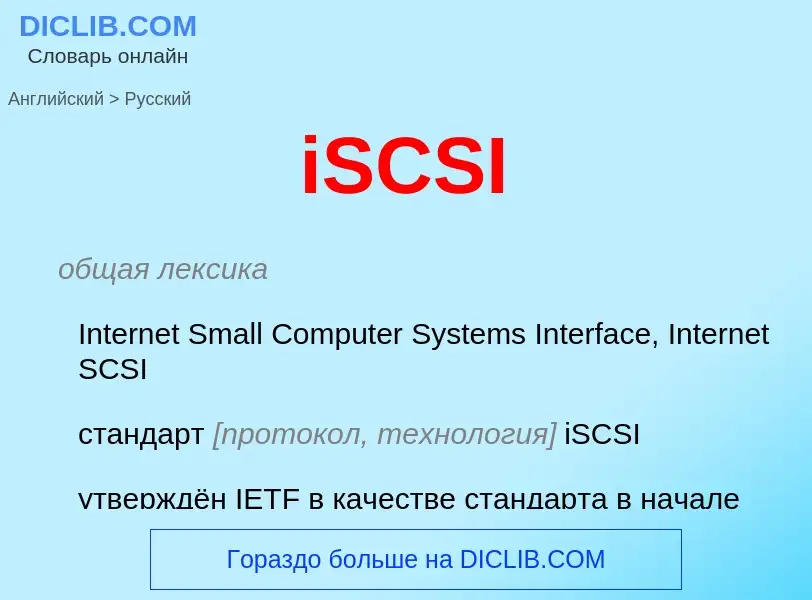Traduction et analyse de mots par intelligence artificielle ChatGPT
Sur cette page, vous pouvez obtenir une analyse détaillée d'un mot ou d'une phrase, réalisée à l'aide de la meilleure technologie d'intelligence artificielle à ce jour:
- comment le mot est utilisé
- fréquence d'utilisation
- il est utilisé plus souvent dans le discours oral ou écrit
- options de traduction de mots
- exemples d'utilisation (plusieurs phrases avec traduction)
- étymologie
iSCSI - traduction vers Anglais
общая лексика
Internet Small Computer Systems Interface, Internet SCSI
стандарт [протокол, технология] iSCSI
утверждён IETF в качестве стандарта в начале 2003 г. Позволяет передавать данные по глобальным и локальным сетям, а также через Интернет. Инкапсулирует команды и данные протокола SCSI в заголовки пакетов TCP, пересылаемых по сетям IP
общая лексика
Switched Bunch Of Disks
коммутируемые жёсткие диски
группа жёстких дисков (JBOD), с встроенной системой коммутации, а не на общей шине типа iSCSI
Wikipédia
Internet Small Computer Systems Interface or iSCSI ( (listen) eye-SKUZ-ee) is an Internet Protocol-based storage networking standard for linking data storage facilities. iSCSI provides block-level access to storage devices by carrying SCSI commands over a TCP/IP network. iSCSI facilitates data transfers over intranets and to manage storage over long distances. It can be used to transmit data over local area networks (LANs), wide area networks (WANs), or the Internet and can enable location-independent data storage and retrieval.
The protocol allows clients (called initiators) to send SCSI commands (CDBs) to storage devices (targets) on remote servers. It is a storage area network (SAN) protocol, allowing organizations to consolidate storage into storage arrays while providing clients (such as database and web servers) with the illusion of locally attached SCSI disks. It mainly competes with Fibre Channel, but unlike traditional Fibre Channel which usually requires dedicated cabling, iSCSI can be run over long distances using existing network infrastructure. iSCSI was pioneered by IBM and Cisco in 1998 and submitted as a draft standard in March 2000.




